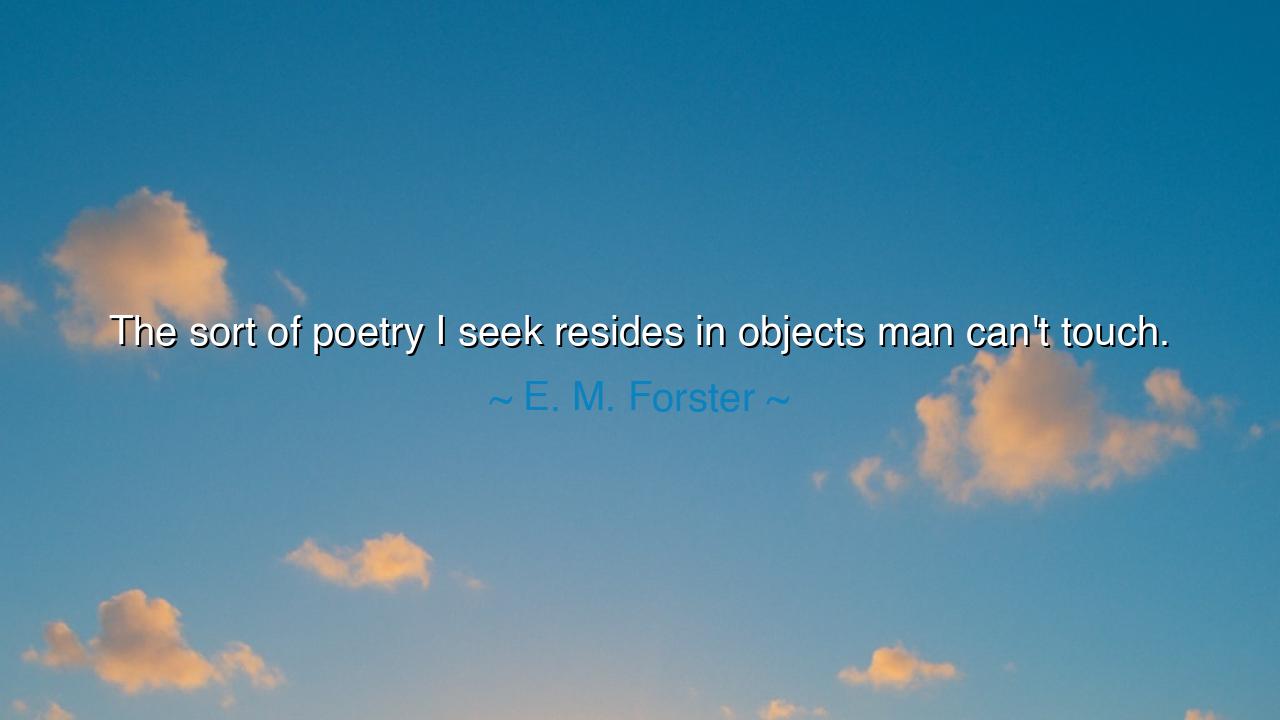
The sort of poetry I seek resides in objects man can't touch.






“The sort of poetry I seek resides in objects man can’t touch.” Thus spoke E. M. Forster, novelist and thinker, whose words remind us that true poetry is not bound by the tangible world but lives in the unseen, the eternal, and the immaterial. He sought not merely beauty in flowers, rivers, or stones, but the invisible truths that lie behind them—the breath of spirit, the shadow of mystery, the resonance of things beyond the grasp of hands.
The meaning of this saying lies in its insistence that poetry belongs not only to the physical but to the metaphysical. The table may be touched, the tree may be felled, the body may be measured—but love, sorrow, longing, hope, and eternity cannot be seized. These are the objects man can’t touch, and yet they are the richest soil of poetry. Forster declares that it is in these intangibles that poetry flourishes, for the poet’s task is not merely to describe surfaces, but to reveal what lies beneath, beyond, and above.
The origin of this conviction is tied to Forster’s place in the modern world, a time when science and industry made visible things seem supreme. The age of machines prized what could be built, weighed, and owned. Yet Forster, like many artists of his era, felt the hollowness of this obsession with the material. He turned instead to the unseen connections of the heart and the spirit—those invisible truths that no machine could measure. His novels, and his reflections on art, sought to recover the poetry of the intangible.
History offers countless examples of this truth. Consider the Sermon on the Mount, where Christ spoke not of coins or kingdoms but of mercy, humility, and love. These were objects man can’t touch, and yet they reshaped civilizations. Or recall the poetry of Rumi, who sang not of gold or conquest but of longing for the divine. His words endure because they point beyond the visible to the eternal. Forster, in his way, joins this lineage, affirming that poetry must reach into what cannot be grasped by hand, only by soul.
The lesson here is that the deepest truths of life cannot be owned. You may possess wealth, yet never touch joy. You may hold a body, yet never touch love. You may measure a star, yet never touch wonder. Poetry lives in this paradox: it makes us aware of realities beyond our reach, and by naming them, it brings us closer to them. The poet, therefore, is not merely an observer of the world, but a seeker of the unseen.
Practically, this means we must cultivate attentiveness to the invisible. When you write, do not settle for what the eye alone perceives—listen for what the heart perceives. When you live, do not measure your worth by what you can hold, but by what you can feel, remember, and give. Seek the objects man can’t touch: kindness, courage, forgiveness, love. Shape them into your speech, your writing, your actions, and you will be living poetry.
Thus the teaching endures: the poetry that matters most does not reside in gold or stone, but in the invisible riches of the spirit. E. M. Forster reminds us that the poet’s task—and indeed every human’s task—is to turn toward what cannot be held, yet holds us all. Let us then pursue the intangible, and in doing so, let us create a life that itself becomes a poem—rooted not in what the hand can touch, but in what the soul alone can know.






TDThanh Dinh
Forster’s view of poetry as something that transcends the physical world is fascinating. It suggests that poetry is about exploring the invisible or the unknowable. But does this make it a more exclusive form of art? Can poetry only exist in these intangible spaces, or is there room for poetry to explore both the material and immaterial world? I wonder if the best poetry balances these realms, inviting us to reflect on both what we can and cannot touch.
PTÐang Phuong Thao
Forster’s perspective on poetry being linked to things we can’t touch resonates with me—it feels almost spiritual or mystical. But I’m curious, what kind of objects or ideas does he mean? Could it be that poetry exists in emotions or fleeting moments that we can’t hold onto? Does this make poetry more elusive, or does it enhance its ability to express what words alone can’t fully capture? How do you interpret the objects that can’t be touched in poetry?
NHPhuong Lynh Nguyen Hoang
I really like how Forster frames poetry as something that lives beyond the material world. It makes me think about how poetry often taps into deeper truths or universal feelings that are difficult to define or grasp. But does this make poetry less accessible to those who connect more with the tangible, physical world? Is there a place for poetry about the everyday, or is it only the abstract that can truly capture the essence of life?
HLHieu Lam
Forster’s idea of poetry residing in things we can’t touch is intriguing. It suggests that true poetry is not about physical objects, but rather the intangible, abstract elements of life—emotions, ideas, or experiences. I wonder, though, does this imply that poetry is inherently about the unseen or unknown? How much of poetry is about exploring the ineffable, and can it still be powerful if it deals with things we can touch and see?